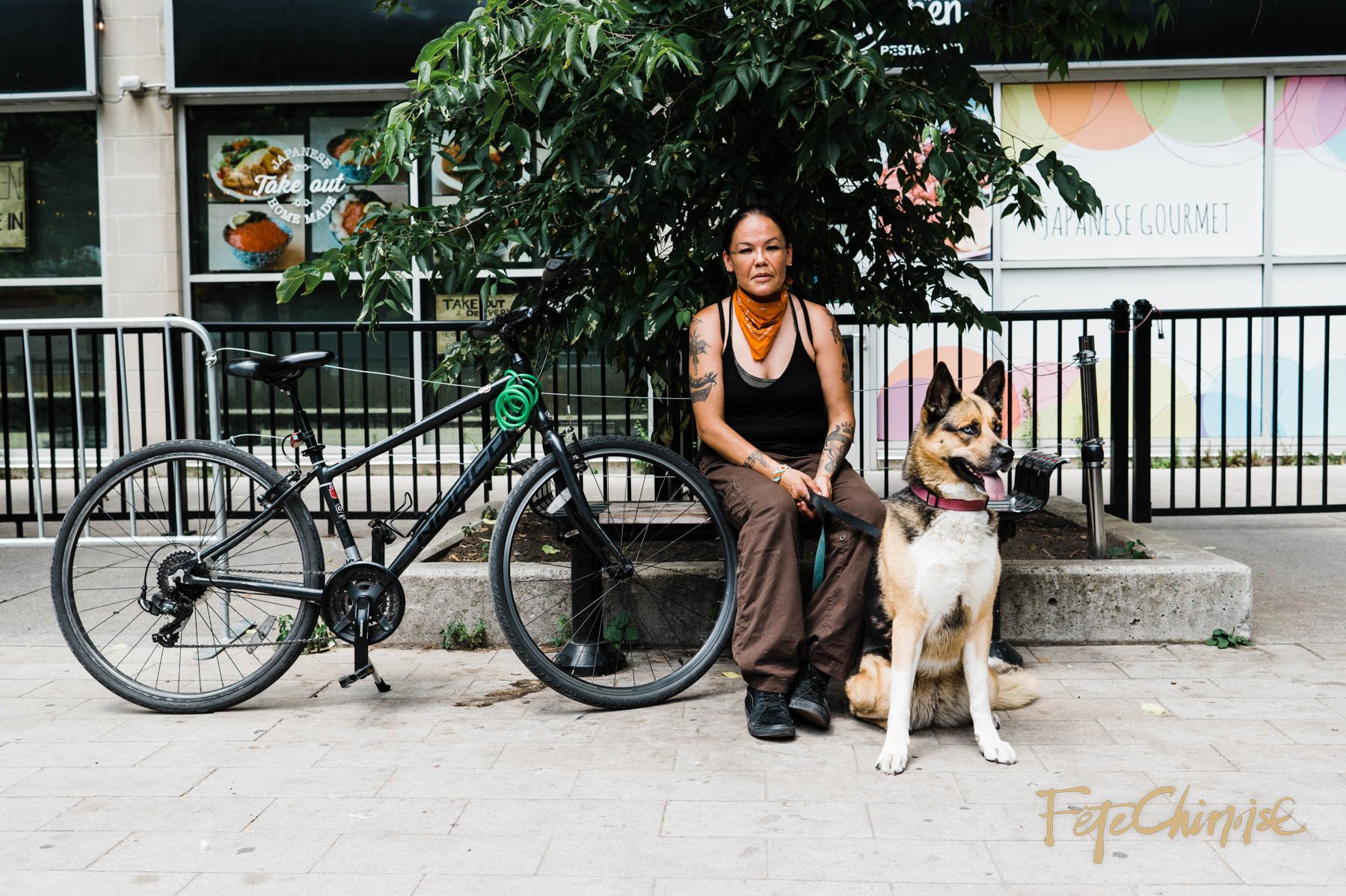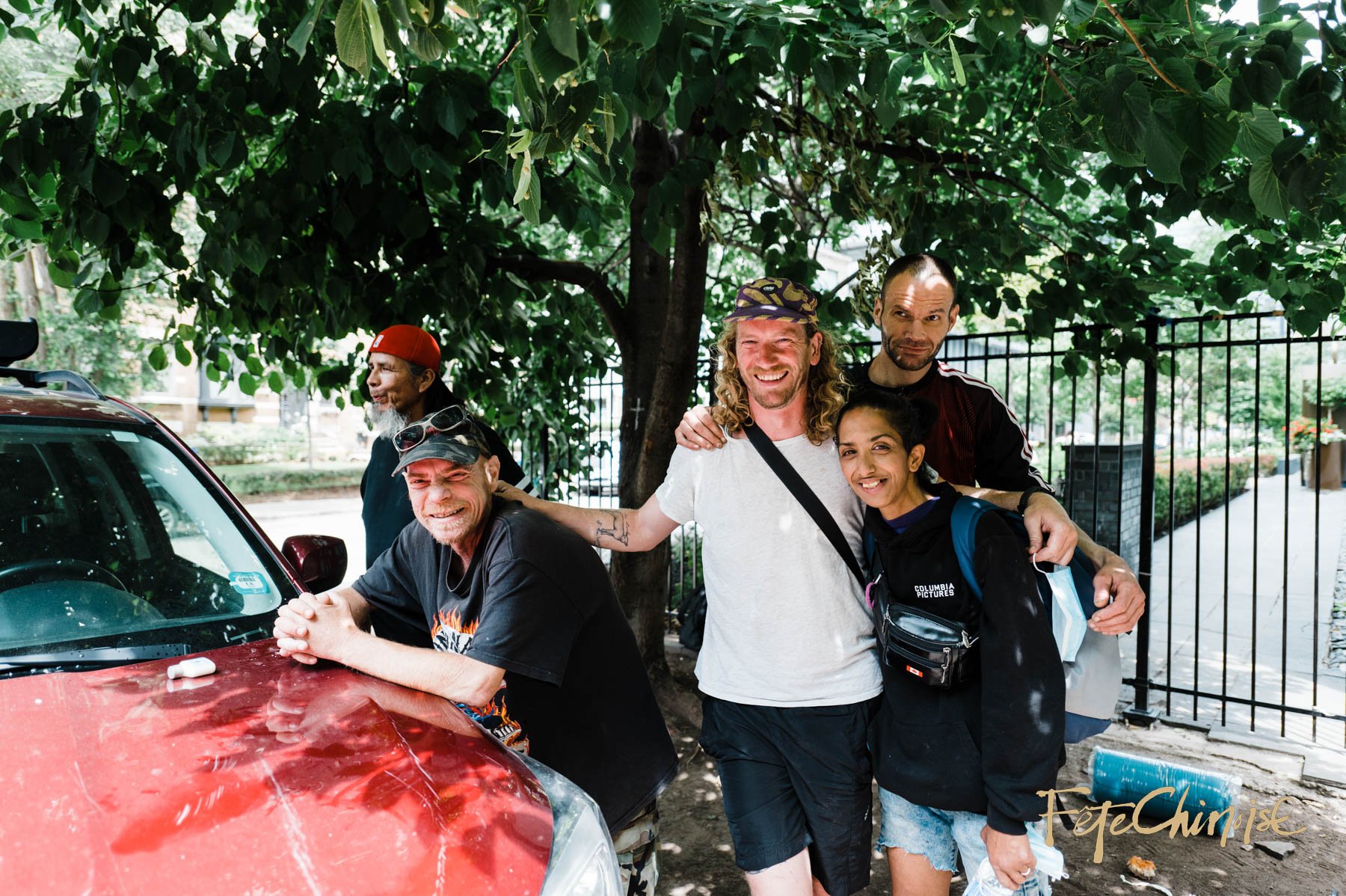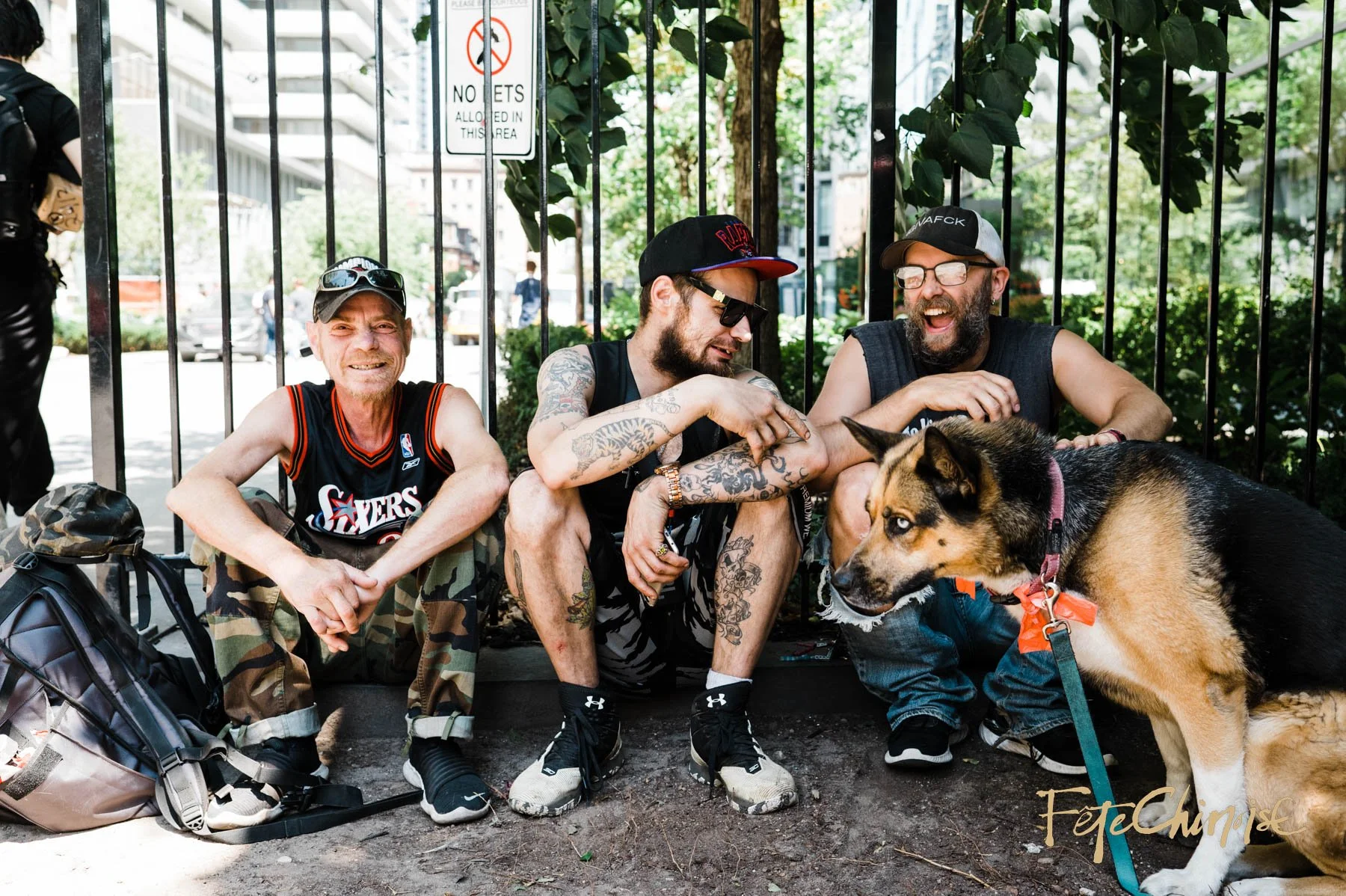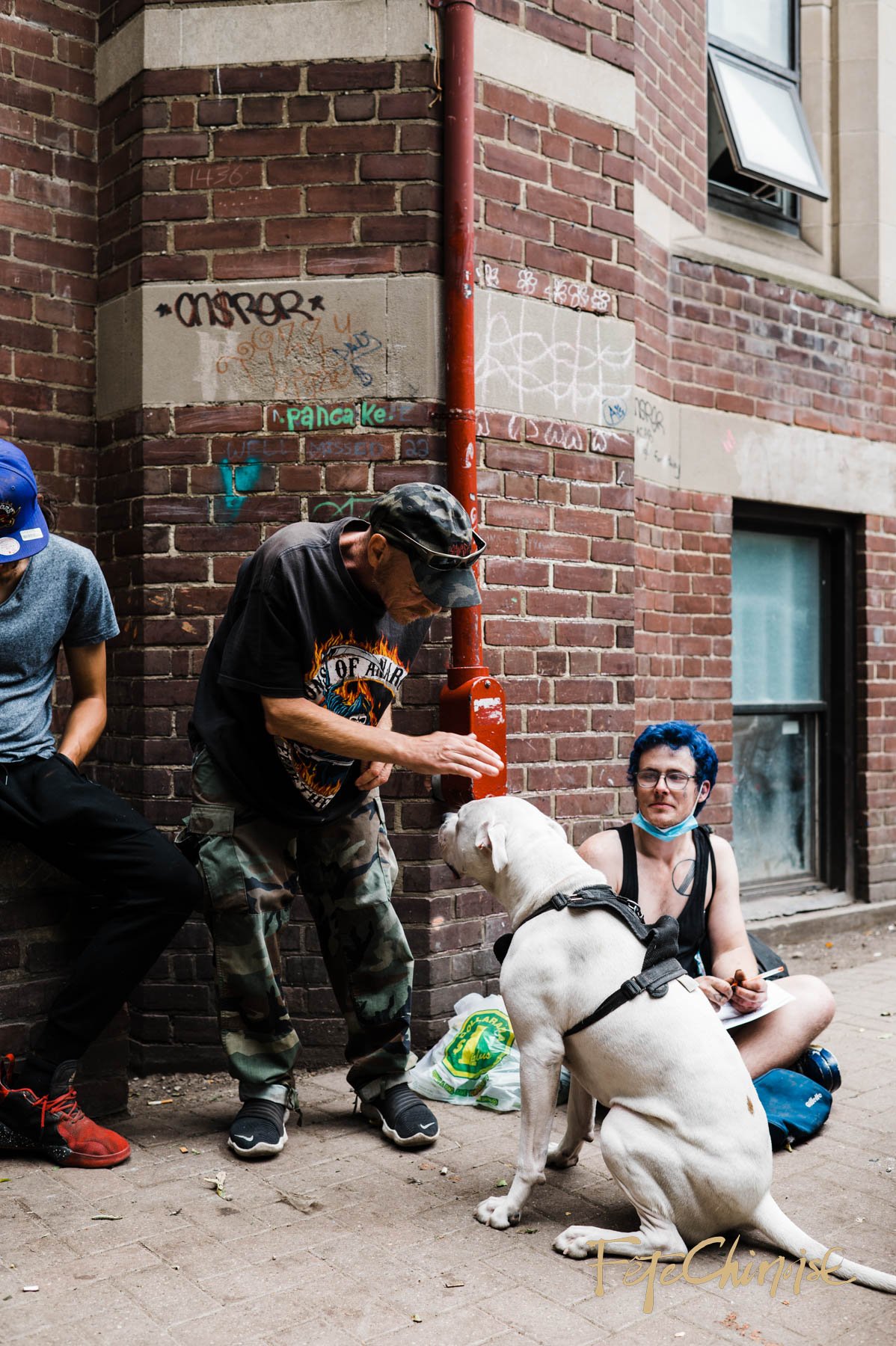Living Unseen: Lorraine lam 我盼望,大家都可以看見未來!
English 英 : Lorraine Lam | Chinese 中 : Eva Cheung
VENUE: Sanctuary · ART DIRECTION + PHOTOGRAPHY: Claudia Hung
PHOTOGRAPHY ASSISTANT: Roban Dayal MAKEUP & HAIR DESIGN: Maggie Ng, Pro Beauty Artists
PARTICIPANTS from the community: Adrianna S, Cerima W, Chris B, Chris B-T, Lila V, Nikki S, Nikka, Rob D, Tim B
*Name has been changed to preserve privacy 為保障個人私隱,文中提及的名字全屬虛名。
“Help! Someone get some help!”
It was the early days of COVID-19 in Toronto. While much of the city was safely isolating at home and learning to bake sourdough, many people who were homeless and poor were not afforded these same basic luxuries. With nowhere to live, no public spaces open for respite, my colleagues and I worked overtime to provide food, water, bathrooms, and social connection to many. It was in the middle of a community meal when someone found Colin* in his tent — lips blue, skin pale. My colleague and I bolted over to perform life-saving measures that had become second nature to us.
One and, two and, three and… fourteen, fifteen chest compressions. He gave two breaths.
This rhythm continued steadily as we knelt on our knees and hovered closely over Colin’s lifeless body, performing rescue breathing and CPR.
C’mon Colin, c’mon.
That same afternoon I attended a meeting hosted by the City of Toronto to address COVID-19 responses for those who are homeless. I wolfed down a quick dinner before facilitating a workshop for neighbourhood residents who were interested in de-escalation skills. I didn’t think about Colin for the remainder of the day; I had no emotional space. The pandemic was in full force and there were little to no resources for those who were left behind; along with other colleagues in the sector, we were just focused on keeping people alive and safe.
C’mon Colin, c’mon brother. Just breathe.
It had already been a long spring and summer of 2020. Torontonians were told to wash their hands, socially distance and stay home in order to stay safe. But where does one go if one doesn’t have a home? When you live outside, what public bathrooms do you use when all stores and public spaces are closed? How do you socially distance when you live in a dorm-styled shelter setting with a hundred other men? The pandemic was leaving many people behind — people who were already struggling prior to it. I was working double my hours: frontline, advocacy, while wrestling with my personal grief and loss at the record-breaking number of people who were dying from overdoses and other preventable reasons.
C’mon Colin… breathe!
Weeks later, I was sitting with Numbers on Yonge street as he was panhandling. It was a sweet conversation, punctuated with moments of comfortable silence. He asked me how I was doing, and our decade-long friendship meant I could be truthful. With tentative honesty, I told him that I felt sad and helpless, feeling the weight of the world and incredibly discouraged: things felt like they were going from bad to worse everyday. I had just lost another friend on the streets, and advocacy efforts felt like they were falling on deaf ears. I expressed my weariness and uncertainties I had around the work I had been so involved in for over a decade. He looked at me from his cup after someone dropped some quarters in.
“Lorraine, you can't stop hoping. If you do, what about us?”
Colin died. We couldn’t save him.
I can’t stop hoping.
We live in a world compounded with so many societal problems, fractures, and systems that seem impossible to navigate or change. Homelessness, climate change, racism, gender equality, migrant worker rights, inflation… it is no wonder that our mental health and our ability to cope feel depleted. On one hand, many of us long to be a part of making the changes we want to see in the world, but on the other, we feel overwhelmed. We don’t know where to start; the magnitude of compounding societal struggles is overwhelming; and… do our small efforts really count? How do we dive in? How do we persevere? How do we remain hopeful that our smallest efforts count in the long-term fight for change? Can recycling my pop really lead to a reduction in climate emissions on a global scale?
In my first year at the University of Toronto, I hoped to volunteer at a soup kitchen for those living in poverty and/or unhoused. My culinary skills were limited to making the perfect bowl of instant noodles and, if feeling ambitious, with a fried egg (and luncheon meat, to my mother’s dismay). Needless to say, I was not very helpful in the kitchen. Instead, the program coordinator invited me to sit in the dining room and spend time with guests. “Get to know people,” he told me. I was terrified. What if I say something wrong? What if I don't know what to say? Is it ridiculous to ask “how was your day?” to someone who clearly spent the night sleeping out in the cold? Plus, as an introvert, mingling in a large group of strangers just seemed like a total nightmare.
I walked timidly to the back of the room and sat down in the one empty seat that was available at the corner table. It was clear that the gentlemen had known each other for a long time and the camaraderie amongst them was palpable.
I nervously said “Hi, I’m Lorraine; I’m new here,”
and my stomach flipped circles. Would they ignore me? Talk to me? Scoff at me?
I quickly became acquainted with “The Crew” and to say the least, the rest is history. They welcomed me into their clique and generously shared their gift of friendship with me. They became my friends and my brothers I never had: 12 years after that initial meeting in the back corner table, Chris walked me down the aisle on my wedding day.
It was The Crew who brought me to Sanctuary a few weeks after we first met in the fall of 2006. Since then, it has become my home and eventually my workplace. Sanctuary is a community that centres people who have been excluded and marginalized because of larger systemic structures. Those who are core in this community are people who are unhoused/under-housed, wrestling with addictions and mental health barriers, living very much under the poverty line, lonely and isolated. While the larger society may say otherwise, this community is one that is intelligent, hardworking, and giving. They model what love, loyalty and radical generosity looks like. Years ago, I spent a summer overseas volunteering in Serbia. I went down to see the community the day after I returned to Toronto, and found some of my favourite people on the usual street corners. “I'm so glad you’re safely home!” Harris grabbed my hands tightly in his, and opened up my palms. He dumped his entire medium-sized Tim Horton’s cup of change into my hands and said, “buy yourself dinner on me.”
That was his entire day’s savings and work.
One spring, Bonnie gave me a gift card to a grocery store of $13.03 for my birthday. She wanted to give me a gift but with no extra income, she was unable to purchase anything. Instead, she gave me the balance of the gift card she received from a food bank. This was what she would have used for her week’s groceries.
A few winters ago, Jake had just gotten out of jail and it was the middle of winter. He had a jacket and a sweater, with nothing else to his name. He met me to grab a coffee and talk about his application for housing, and along the way, we ran into a young girl that he knew who lived in a tent. She was wearing only a t-shirt. “I’d rather be the one freezing than her,” he said, as he gave her his jacket off his back.
Sponsored by T&T Supermarket
Jake had dreams of becoming a youth worker. He wanted to mentor young men to make different decisions than he did, to avoid being in the circumstances he found himself in — many of which were rooted in realities he had no control over. He had been on several waiting lists for affordable housing, and in the meantime, had figured out how to survive on the streets without losing his humanity and heart for others. The current waitlist for affordable housing is over 10 years long for a single person; and longer if you have a family or require accessibility needs. Many people end up dying before they get a chance to sign that lease. In mid-November 2020, I received a call informing me that Jake’s opportunity for an apartment was finally here. I scoured the city looking for him in his usual spots to deliver the news, but could not find him. Late afternoon, I received a phone call: he was found deceased earlier that day. Jake never got to see that apartment, nor become a youth worker. The average age of a male in Toronto is 80 years old, but that of a homeless male is nearly half that: 49 years old.
Jake had just turned 30.
Harris, Bonnie, Jake… these stories are not uncommon. There are often one-dimensional stories and portrayals about people who are poor or unhoused, but in reality, there is much beneath the surface. Each person is a brother, mother, niece, cousin, friend, lover.
Each person has weathered storms I could never imagine, and survived inconceivable struggles with creativity, strength, resourcefulness, and tremendous faith.
At Sanctuary there are also retired professors, wealthy bankers, university students, and working professionals who gather with us. The reality is: whether we are rich or poor, Asian or Black, homeless or not - we need each other.
It was Desmond Tutu who said,
“ My humanity is bound up in yours, for we can only be human together."
For those of us with more privilege, we have much to learn and receive from those whom society has left behind. Together at Sanctuary, our community gathers for family-style meals, and we also have a healthcare clinic, arts programs, a Sunday worship service, and outreach support.
A study has shown that it takes 200 hours to become best friends with someone, and while that my goal at Sanctuary is not to be best friends with everyone, the hours I spend in the community have formed some of the most transformative friendships in my life. Many of us will relate: some of our longest and closest friendships are often with people who we spent many consistent hours with: shared work and school environments, hobbies, roommates, even running errands… the point is, simply being together is what deepens friendships over time. As an outreach worker, my role is centered on spending time with people in varying contexts and relationship-building. Whether on street corners or in our meal programs, in jail visits or hospital waiting rooms, walking around the neighbourhood, moving into new apartments or yet another memorial service, I have the honour of walking alongside strangers who become family. Sometimes my days consist of sitting in the park and simply talking with those I see. Other times, it is taking a heartbroken community member for ice cream in the neighborhood so they feel a sense of normalcy. On the surface, it might not look like I am doing much; but creating space to talk, to be, to grieve, to celebrate together is the basic building block in this work towards long-term transformation and healing. I remember when Forester found out his younger brother died: when he found out, he came straight to Sanctuary and sat at the side of the building: we sat together and cried. Perhaps the dark alleyway surrounded by garbage and recycling bins might not feel like refuge, but for Forester — it was. It was a place of comfort, familiarity and friendship. We all desperately need a space of belonging, acceptance, and home, and for a community in which there is so much uncertainty and unknowns, being able to help facilitate that at Sanctuary is a gift I do not hold lightly.
It’s hard to believe that it's been over ten years since I first stepped foot at Sanctuary and dove into the work. The rhythms of my day-to-day work are punctuated by both bursts of intense grief and meaningful highlights and celebrations. In less than ten years, all but two from The Crew have died; most before turning 50. Resources continue to be limited, and we hit record-breaking numbers of homeless people dying regularly. Government policies are increasingly oppressive, effectively making it near impossible for people who were already struggling to survive. Basic human needs like food, bathrooms, and housing are not accessible to many people: thousands of people are homeless in Toronto and the meagre amount social assistance provides means more and more people rely on food banks. The toxic drug supply means record numbers of people dying from overdoses. On top of survival, many of the community members navigate layers of complex trauma - past and present. Advocacy efforts and lobbies for change land on deaf and apathetic ears. If I’m honest, there are days when I question whether this work matters; whether we are really making any changes.
But then I will see Spanish put on an apron and hairnet and spend Thursday night cooking meals in our kitchen
for our dinner program. Spanish, a young woman with on-and-off mental health and addiction stability with a sense of reality sometimes much different than many others’.
I will see Nicole move into the first apartment of her own. Nicole, a young Indigenous woman in and out of violent domestic relationships now able to decorate her home with posters and have regular visits with her children.
I see Sam, once a youth on the streets, now mentoring young street people as he navigates his drinking to raise his daughter with his beautiful wife in their home.
I see Paula, walking down Queen Street with her stroller after dropping off her eldest toddler daycare. Now pregnant and parenting her two children, she was 18 when I first met her: on the streets, unable to have custody of her other four children.
Change happens in small increments; and frankly, some of the changes I want to see might not happen in my lifetime. This does not dismiss the urgency and importance of the work; in order to keep going, I must pursue the discipline of hope. I cannot stop hoping. In the words of Sarah Bessey:
“Hope is subversive precisely because it dares to admit that all is not as it should be.”
Hope differs from optimism in that it is a discipline: an active choice everyday to continue hoping and believing that all is not as it should be, but it can be different.
I can’t stop hoping.
The work I get to do is hard on some days, but what often feels harder is trying to invite others in to participate in the longterm work towards change. At the start of the pandemic, I witnessed an increased outpouring of support for the community; but as normalcy of life has begun to resume, this support has waned significantly. Many people will consider the needs of the poor during Christmas, making meals and volunteering at shelters once a year. It is convenient to donate clothes when moving and purging. But what about the rest of the year when it requires more sacrifice and inconvenience to engage in the work? There is a constant reliance on donations — financially and through resources, and it is important that what is being given is appropriate to the work that is happening. Clothing that is in season, food that is unopened, finances to purchase items that are hard to donate — those are all incredibly helpful. When unsure of what to give, asking is always the best first step. Sorting unhelpful and unneeded donations creates more work for a sector that is already burnt out and exhausted.
While donating resources is an excellent first step in getting involved, long-term change requires an intentional commitment to ask different questions and engage the work beyond our yearly giving. Charity is focused on alleviating immediate needs; it often centres the desires of those with more privilege to help “those less fortunate”. Justice, however, is concerned with eliminating the need for charity altogether. It centres those with least power, and asks the question: how can we live in a world that does not depend on charity? Instead of donating meals at Christmas, what does it mean to co-create a world where no one goes hungry? How can we have conversations with those around us to move towards longterm justice work together?
Many of us know the Golden Rule: “Love your neighbour as yourself”, but how many of us really know our neighbour? How can we love our neighbours if we do not know them? People live separate lives with hidden garage entrances into their homes, avoid eye contact in apartment buildings, and rarely is there any need to know the people you live around, nor do we need to depend on anyone. Perhaps this is especially relatable the immigrant way: put your head down, do the work and be self-reliant: Save face. Don’t depend on anyone for anything. Don't show weakness. Perhaps this also speaks to the world we live in today. With COVID, our isolation was unveiled. Our vulnerabilities showed — whether emotionally or physically. People are lonely, struggling financially, and just feeling unsettled.
During the era of sandwich runs in the 2000s, I reluctantly participated with my Chinese-Canadian church’s youth group but I mostly just wanted to talk to people instead of handing out sandwiches. I wanted to know the neighbours we were supposedly helping. Besides, why were we making poor people eat our cheap bologna sandwiches? Why weren’t we offering char siu rice with a Vita lemon tea? If we are supposed to love our neighbours as ourselves, I know I surely would prefer that.
To commit to longterm change, we need to know our neighbours. We can start locally: just on our own street. We can start in our neighbourhoods. When “issues” become loved ones, we cannot look away. “Homelessness” to me is now about my friend Rick, who froze to death in his wheelchair a few winters ago. The push for a minimum wage increase is about my friend Luke, who has worked years at McDonald’s and still cannot find anywhere affordable to live in Toronto, and is in a shelter. The “opioid crisis” is about my friend Chris, who died from an overdose. These “issues” are no longer simply data, research and statistics, but they are loved ones. I cannot look away.
We cannot look away.
There is no us vs them; it really is just “us”. That is justice. The world is not as it should be, and we can make a difference — no matter how small.
May we get to know our neighbours and love them.
May we choose to move beyond charity and towards justice. May we let our curiosity and desire for change lead us to ask better questions and have more critical conversations.
May we never stop hoping.
「救命!有人暈倒了,快來幫忙!」那時還是新冠肺炎的早期,多倫多正處於居家令初期,露宿者們居無定所,沒有地方暫住,亦不能負擔「奢侈」的日用品。我和同事們不眠不休地為他們準備食物、水和洗澡的地方等。用餐的時候,有人發現帳篷中的Colin暈倒了,嘴唇發紫、面無血色,於是我和同事馬上向他施展心肺復甦法急救。
失衡的社會
一下、兩下、三下……每次十五下的心外壓,再加上兩口人工呼吸。我們一直保持這個節奏,希望可以盡力把他喚醒。
這個疫情令社會遺忘了很多人,特別是像Colin般原本已被社會遺棄的一群! 試想想那些沒有家的人,一直在外流浪,當商店都關閉的時候,哪有地方休息?當過百人逼在庇護所內有限的空間,怎能保持社交距離?站在最前線,我常常需要超時工作,但似乎仍不足夠,每天都有人死去,我也救不了他們。瘋了,這個社會已經失衡了! 我們真的能改變世界嗎?
庇護中心內的友誼
2006年的秋天,我開始了在庇護中心(Sanctuary)的工作。它是一個為邊緣人士提供服務的社區中心,主要服務對象為露宿者,貧困或精神健康不佳人士。有研究指出,每人平均需要用200小時去結交知心友,身為外展社工的我,在這裡認識不同的陌路人,與他們建立起人與人之間那小小的橋樑,獲得很多寶貴的友誼,亦是我婚禮上的賓客。
幾年前,我到塞爾維亞做義工後回到中心,Harris衝上前捉住我的手臂對我說:「歡迎你平安回來!」他一手拿起行乞一天得來的收入,放到的我手中慶祝我回來。那零零碎碎的是他一整天的收入…….
一個春天,Bonnie在我生日時,送我一張價值$13.3加元的現金禮品卡。她想送我一份體面的禮物, 但身無分文。那張禮品卡的餘額足夠她購買一週的食物,但她自己不捨得用,卻送給我作為生日禮物。
幾年前的寒冬,Jake從監獄中出來,身上只穿了一件汗衣和外套,他邊走邊跟我談起他的房屋申請。突然,他看到一個之前認識的女孩只穿有一件單薄的上衣,便把身上僅餘的外套讓了給她。
Jake夢想成為一個青少年輔導員,希望可以引導那些迷途中的羔羊,不要重蹈他的覆轍。他所申請的低收入的房屋,在多倫多的等候名單大慨需要二十年。
2020年的11月,我收到房屋署的電話,說有單位可以讓Jake居住;我雀躍地穿梭在人群中尋找他的身影,卻怎樣也找不到;那天下午,我卻收到一通電話說他已離世……他永沒機會看自己的新居和做他夢想的工作了。多倫多男士平均壽命有80歲,無家可歸的人壽命減半,約49歲。但是那年,Jake只得30歲......
數不清的問題
或許Harris、Bonnie和Jake的故事對你來說十分普遍,但是你真能了解故事背後,他們所經歷那些心酸、痛苦和無助嗎? 在中心裏,服務對象包括專業人士、退休教授、銀行家、大學生等。不論窮富、身份地位和種族,無分彼此。
Desmond Tutu格言:「我有人性是因為,你在我身旁」。我們為中心內有需要人士提供膳食,也有外展服務和周日崇拜等。在這裡,沒有人會質疑你,並會接受你的一切。初開始時,我覺得自己並沒有貢獻,但逐漸感到與大家的關係更加親近。那天Forester得知弟弟去世後,我們一起在街頭抱頭痛哭。對他人而言,難以忍受居住在垃圾堆中,但那卻是他唯一感到舒心、安全的地方。
不經不覺間我已經在這裏工作了超過十年,期間經歷過大大小小的事:Rick因為路宿街頭在寒冬中離去,Luke每天努力工作所賺到的最低工資也不夠付房租……社會上有種種不完善的制度和漏洞,令我們身心疲累、筋疲力盡。尤其現在我們正面對一場看似沒完沒了的持久戰。在疫情間的社區的資源很短缺,死亡人數創了新高。政府的政策完全幫助不了當下有即時急切需要,或連基本食物也沒有的人。有時,甚至把他們一步一步推到深淵。
關懷比三文治重要
在疫情期間,人與人之間的距離疏遠了很多。誰可以慰藉你那疲倦的心靈?聆聽你真正的需要?在多倫多有大概有一千個露宿者,他們靠着些微的社區援助生存,你覺得真的足夠嗎?
不少人背後有着不同以及多重的慘痛經歷,你有嘗試好好去了解他們嗎? 這個社會的政策和服務,真的是在幫助他們嗎?其實不必在聖誕節前夕時才想起弱勢社群,今天就從身邊鄰舍開始吧!在日常中,捐贈衣物或食物其實能幫上很大的忙。
另外,你亦可以嘗試問問他們,好好地了解他們的需要,從心幫助他們。只要嘗試踏出那小小的第一步,你的舉動會悄悄影響着別人的生命,令他們覺得人間有愛。
在2000年的三文治派發活動中,我並沒有好好派發三文治,只顧着跟露宿者聊天,因為我知道那份三文治遠遠不是他們真正的需要。他們更需要的是那一份關懷、體諒以及理解去安撫他們那顆孤獨的心。
我的工作十分艱難,同時我在中心見證過一個又一個改過自身、重回正軌的例子,很值得欣慰。患有精神健康問題和癮患的Spanish能獨當一面地在廚房中為大家做飯;曾經活在家暴陰霾的原住民女孩Nicole,正搬進她的新住所;不再酗酒的Sam已投身成為青少年輔導員;從前只會帶着小孩在街上遊蕩的Paula,如今把小孩送去日托……這些動人故事,每每提醒着一切也值得的,終有一天可以等到改變的來臨。
勿以善小而不為
慈善機構慣常用語「施比受更有福」,為甚麼我們不可以活在一個無並沒需要有慈善團體、沒有人捱餓、人與人之間會自發互助的社會?很多改變對你來說是很微不足道,但對受助人的影響卻很深遠。由今天開始,希望你也可嘗試了解別人的需要,成為他們的小天使。
在這世界, 沒有分你們、 我們或他們,只有我們。只要大家團結一致可盼望到平等、互助互愛的世界。
Sarah Bessey說過: 「我勇敢去想,只要相信,便會發生。」或許,我們應繼續相信那天的到來… …
SPonsored by T&T Supermarket























The Toronto Public Library Foundation’s Biblio Bash once again graced the halls of the Toronto Reference Library yesterday, continuing its tradition since 2017. This annual black-tie fundraiser brings authors, literary enthusiasts, and philanthropists together to support the Toronto Public Library’s most pressing needs. This year, the funds raised will unlock opportunities for newcomers to Canada to support vital library services that assist individuals and families settling in our city.